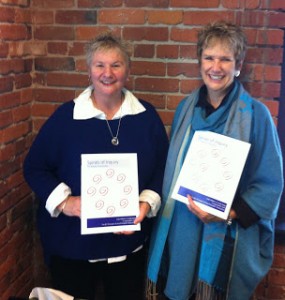Chris Kennedy and I are excited to host an upcoming Twitter chat with BC educational leaders and authors Judy Halbert and Linda Kaser. The chat will focus on key areas from their latest book “Spirals of Inquiry” (see below) and will take place this Sunday, May 26 at 8pm Pacific with the hashtag #inqBC.
Here is more info taken directly from Kennedy’s recent post:
Judy Halbert and Linda Kaser have been at the forefront of teaching and learning in British Columbia for decades. I have written previously about their work with theNetwork of Performance Based Schools (now the Network of Inquiry and Innovation). Their latest book Spirals of Inquiry For equity and quality is a welcoming book; it takes us from where we are and invites us on a team journey. Halbert and Kaser have a wonderful way of bringing us aboard and to become part of their team – “We have had the privilege of working together on system transformation for a number of years. We have experienced the joy of teamwork and the support that comes from facing challenges with a trusted learning partner. Inquiry is not a solitary pursuit. Meeting the needs of all learners is simply too big a task for any one leader, teacher, school or district to attempt alone.”
I have taken a stab at defining inquiry in my post All About Inquiry; I referenced the work of the Galileo Educational Network and in reviewing previous posts realize that I have made reference to inquiry in one out of every five posts written. Inquiry is THE buzz word in education, but while there is opportunity there are also drawbacks that can be attributed to one word used so often, by so many, in so many circumstances. There is general agreement we want more inquiry (the anti-inquiry movement is quite quiet), but exactly what this is and means is not clear. Although the work Halbert and Kaser describe is hard work, their approach is straight forward. I find it far more accessible than other frameworks and they provide structure without recipe.
Halbert and Kaser encourage us to start our investigation into inquiry with four key questions that “help move our thinking from a preoccupation with content coverage, to a focus on what learners are actually experiencing with the learning we are designing for, or with, them”:
- Can you name two people in this school / setting who believe that you can be a success in life?
- Where are you going with your learning?
- How are you doing with your learning?
- Where are you going next with your learning?
They move into their spiral approach, quoting Madame Gertrude de Stael, “The human mind always makes progress – but it is a progress in spirals.” Halbert and Kaser focus their spirals around several key questions continually coming back to the first:
- What is going on for our learners?
- What does our focus need to be?
- What is leading to this situation?
- How and where can we learn more about what to do?
- What will we do differently?
- Have we made enough of a difference?
While I researched the book to better understand the process of student inquiry, it reminded me that we, as teachers, need to be committed to the same efforts with our own learning.
Halbert and Kaser have created a book with useful approaches to both student and adult inquiry; more importantly, they validate the work in British Columbia, link the efforts they describe with existing practices in districts across the province, and do not hit us with a stick if we are not all doing it yet. I would argue this book should be a must read for all new teachers, and for educators with decades of experience, it is a reminder that we are all part of a big team, who need each other and that our students need us, for as Halbert and Kaser conclude, “Let’s stick together and stick with this work until every BC learner does indeed cross the stage with dignity, purpose and options.”
WANT TO LEARN MORE
Spirals of Inquiry is available through the BC Principals’ and Vice-Principals’ Association for $20 (all proceeds support innovative and inquiring schools).
I encourage you to join us and add your questions and insights May 26 at 8pm Pacific for this important Twitter chat on professional learning through inquiry.

